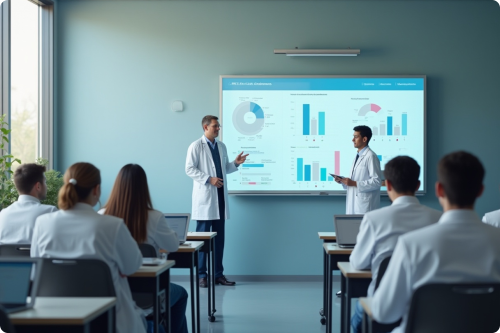How Healthcare University ERP & LMS Enhances Clinical Training in Healthcare Universities
Introduction
In healthcare education, clinical training is the most critical phase that shapes students into skilled professionals. It bridges the gap between classroom theories and real-world medical practice. For healthcare universities, ensuring that students receive structured, consistent, and adequate clinical exposure is a complex challenge. Manual processes for scheduling rotations, tracking attendance, and maintaining patient interaction logs often create inefficiencies. With vmedulife’s ERP LMS module, universities can digitally manage clinical training, ensuring transparency, compliance, and a better learning experience.
Why Healthcare Universities Need ERP & LMS
The challenges faced by healthcare universities are unique :
Managing clinical rotations across multiple hospitals.
Tracking student attendance in both classrooms and clinical wards.
Handling research data, publications, and faculty contributions.
Integrating labs, libraries, and digital resources with student learning.
Ensuring regulatory compliance with medical councils and accreditation bodies.
A Healthcare University ERP acts as a centralized digital platform that connects administration, academics, research, and clinical training into a single system.
Role of ERP in Clinical Training
Clinical training is the backbone of healthcare education. ERP systems enhance this process by :
Rotation Scheduling : Automatically assigns students to different hospital departments (surgery, pediatrics, emergency, etc.) ensuring fair allocation.
Attendance & Hours Tracking : Records the number of hours students spend in clinical practice, required for licensing and exams.
Evaluation Tools : Faculty can digitally assess students’ clinical performance and give feedback.
Integration with Hospitals : Links hospital management systems with the university ERP for seamless data exchange.
This ensures that students receive structured clinical exposure, and administrators can monitor performance in real-time.
The Importance of Clinical Training in Healthcare Education
Unlike other academic fields, healthcare education demands hands-on practice. Medical students need hospital rotations, nursing students need ward exposure, and pharmacy students must understand practical applications in clinical settings.
Clinical training ensures that students :
Develop diagnostic and patient-care skills.
Gain exposure to diverse medical cases.
Build confidence in handling real-world healthcare challenges.
Meet the mandatory clinical hours required by accreditation bodies.
Without effective management, universities risk underexposing students, which directly impacts professional readiness.
Common Challenges in Managing Clinical Training
Scheduling Rotations
Coordinating rotations across different hospitals and specialties is difficult when managed manually.Tracking Attendance
Paper-based attendance systems lead to errors and misreporting.Patient Interaction Logs
Students often maintain handwritten case logs, which are prone to loss or inaccuracies.Faculty Evaluation
Assessing students in clinical environments is often subjective without structured tools.Accreditation Compliance
Universities need to prove that students completed mandatory clinical hours—a challenge without digital records.
How ERP LMS Simplifies Clinical Training?
The ERP LMS for Healthcare Universities digitizes the entire clinical training lifecycle.
Key Functionalities of vmedulife’s ERP LMS
1. Rotation Scheduling System
Automates hospital postings.
Prevents overlaps in rotations.
Ensures every student gets adequate exposure across departments.
2. Digital Attendance Tracking
Biometric and mobile integration.
Real-time monitoring by administrators.
Reduces errors and manipulation.
3. Patient Case Log Management
Students can digitally record cases, diagnoses, and treatment plans.
Faculty can review logs instantly.
Provides insights into student exposure levels.
4. Faculty Evaluation Tools
Structured digital rubrics for evaluating clinical performance.
Real-time grading and instant feedback.
5. Mobile-Friendly Access
Students can update attendance and case logs on-the-go.
Faculty can approve logs and evaluations instantly.
Why vmedulife ERP LMS is Ideal for Clinical Training?
Built specifically for healthcare education.
Integration with hospital systems.
Scalable for universities with thousands of students.
Cloud-based, ensuring mobility and accessibility.
Key Benefits of Healthcare University ERP in Clinical Training
- Centralized Data Management
All student data—academic, clinical, and research—is stored in one place, reducing manual errors and paperwork. - Improved Student Experience
Students get a personal dashboard showing clinical schedules, faculty feedback, and research projects. - Regulatory Compliance
ERP ensures accurate reporting for medical accreditation bodies (like NMC, WHO guidelines, etc.). - Faculty & Hospital Collaborationa
Enables better coordination between faculty, hospital supervisors, and administrators. - Research Support
Tracks faculty publications, research projects, and student theses to build a strong research ecosystem.
Real-World Use Cases of Healthcare University ERP
Medical Colleges : Use ERP to track students’ attendance across hospitals and clinics.
Dental Universities : Manage patient case history records integrated with student training.
Nursing Schools : Coordinate clinical postings and duty rosters with hospitals.
Pharmacy Universities : Manage lab sessions, clinical trials, and drug research records.
This adaptability makes healthcare university ERP a powerful tool across diverse healthcare disciplines.
Future of Clinical Training with ERP & LMS
With the rise of AI, telemedicine, and virtual healthcare, ERP & LMS platforms are evolving to support :
AI-driven performance analytics for students.
Remote learning with virtual patient simulations.
Integration with telehealth platforms for clinical case studies.
Global collaboration by connecting healthcare universities worldwide.
These innovations ensure that medical graduates are future-ready and capable of meeting the demands of modern healthcare systems.
Conclusion
Clinical training is the heart of healthcare education, and managing it effectively is essential for producing skilled professionals. With vmedulife’s ERP LMS module, healthcare universities can ensure structured rotations, accurate tracking, and compliance with ease.
For universities that want to provide world-class healthcare education, adopting an ERP LMS for Healthcare Universities is not just an option—it’s a necessity.

